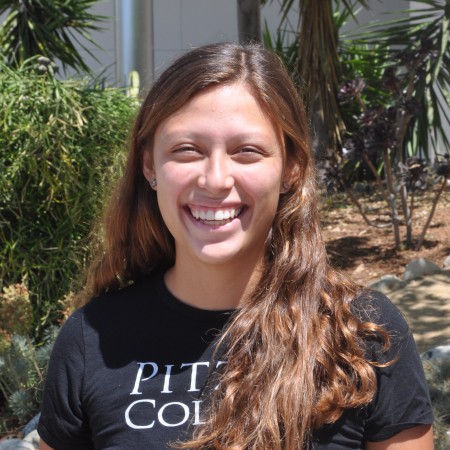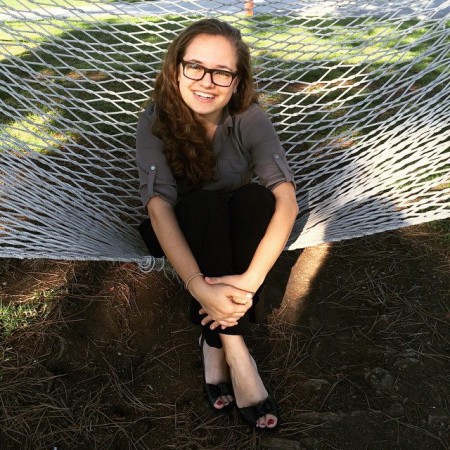Hi readers!
Last year we highlighted 3 outstanding alumni in the spring (if you missed those posts, check them out here!), which gave us a fuller view of how Pitzer graduates tackle the world after their 4 years on campus. This year, we are changing things up a bit and featuring some of our many talented and passionate faculty members.
Topics will range from labor market discrimination research to the importance of teaching at Pitzer, and from postfeminist consumer culture to the Mead Hall murals. Our first professor up is Linus Yamane, Professor of Economics and Associate Dean of Faculty, who was interviewed by AJ ’18 who majors in Economics & Environmental Public Policy Analysis. Stay tuned for other Faculty Spotlights in the months to come!
Linus Yamane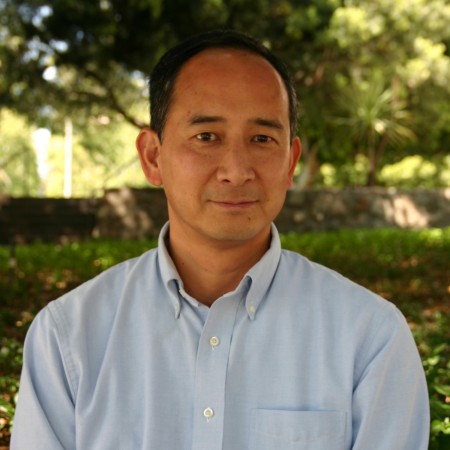
Professor of Economics & Associate Dean of Faculty
With Pitzer since: 1988
Field Group: Economics and Asian American Studies
Research Interests: Macroeconomics, Japanese Economy, Econometrics, Labor Market Discrimination, Asian American Studies
Some Classes He’s Taught: Statistics, Macroeconomic Theory, Macroeconomic Policy
Little Known Fact: He was state Tae Kwon Do champion, and tried out for the U.S. Olympic Tae Kwon Do team in 1988.
AJ asked Professor Yamane questions about his views of Pitzer, his research, and what he loves about his job.
AJ Leon: What makes Pitzer stand out from other institutions?
Linus Yamane: Pitzer, compared to all the other institutions I have worked at, offers students and faculty with a sense of liberty unlike no other. At Pitzer, students have a lot more freedom to develop an undergraduate program of study that is tailored to their specific interests. Faculty have sovereignty in choosing what they want to teach and the way in which they want to teach. Since Pitzer was founded in the 1960s, some elements of the New Left political movement like free speech and academic freedom remain an intrinsic part of the academic fabric.
In that vein, Pitzer is also anti-authoritarian. The power structure at Pitzer is bottom up. If a student or a faculty member wants to start a new club or a new program, and they are willing to do the work to get the ball rolling, it will happen. If the President wants to start a new program, there is not much the President can do without the support of students and faculty. All that being said, Pitzer College is a good place for students and faculty with initiative. With some work, they will be able to see their initiatives come into fruition. It is a place where individuals can make things happen and make a difference.
AJ: What research are you doing here at Pitzer?
LY: Economists are generally interested in understanding how the world works so that society can make it better. My research has evolved over time from income inequality in Brazil to unemployment in the United States to labor unions in Japan to labor market discrimination and Asian Americans.
My current work is on the labor market discrimination faced by Asian Americans, generally wage discrimination and glass ceiling issues. Asian Americans earn less than comparable non-Hispanic white Americans, and are less likely to be promoted into managerial positions than comparable non-Hispanic white Americans. However, the amount of discrimination depends on whether the individual is male or female, native born or foreign born, more educated or less educated, Asian or biracial, the particular ethnic group, and where they live. The world is a complicated place, and understanding all the factors at play in this puzzle is endlessly fascinating.
“Choosing a favorite course is like choosing a favorite child. You love them all, though perhaps for different reasons.”
AJ: What is your favorite course to teach, or favorite course you have taught in the past?
LY: The best way to learn about something is to teach a course in it. Since I love learning about lots of different things, I have had the enormous privilege of teaching about 20 different courses over the years. These include all the core economics courses, numerous upper level economics courses, first year seminars, and Asian American Studies courses. I doubt that any other institution would have given me the freedom to teach such a wide range of classes. When faculty are excited about teaching what they are teaching, we get better courses for our students.
Choosing a favorite course is like choosing a favorite child. You love them all, though perhaps for different reasons. But if I had to choose, I might go with statistics and econometrics. I think every undergraduate should take a statistics class. Of course, I think every undergraduate should take an economics class. While we can talk about different theories about the world all day long, at the end of the day, we want to look at the data. In statistics and econometrics we learn to think very clearly about the world, and how to learn as much as we can from the increasingly large amounts of data that are available to us. We are living in exciting times when we have enormous amounts of data and the computing power to make sense of it.
AJ: What do you love about what you do?
LY: The academic life is a privileged life. The rest of society feeds me, clothes me, and shelters me so that I have time to think about the world. My number one responsibility is to do research which gives us a better understanding of the world. We need to understand how the world works if we are going to make changes which improve social welfare. My second largest responsibility is to share this knowledge with the future generations. We have to equip our students with the tools and skills necessary to make a difference in this world. I love doing both of these things.
I have the best job in the world. I love learning about the world, and I love sharing that knowledge with students. I get to read the books that I find most interesting, play on the computer with large datasets, write about what I care about, and talk with students about all this. When you enjoy what you are doing, you can’t call it work. Even if students don’t always say “thank you,” I can see gratitude and enlightenment in their eyes. This makes all the difference in the world to me.
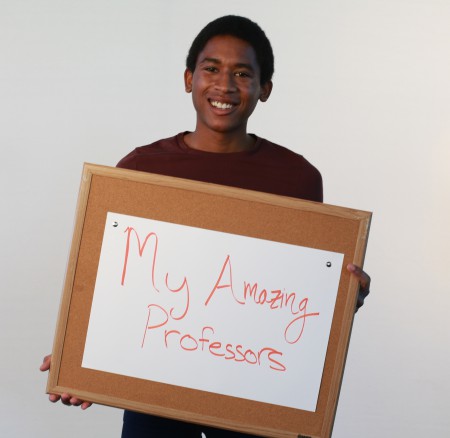 This photo was not taken at the same time as this interview, but we think it is pretty relevant!
This photo was not taken at the same time as this interview, but we think it is pretty relevant!
“I have the best job in the world. I love learning about the world, and I love sharing that knowledge with students.”
AJ: What are your relationships with students like?
LY: The whole point of being at a small liberal arts college is to spend time with your professors. I do not believe in graders, tutors, or teaching assistants. No one should come between the students and the professors. Teaching is the most important thing we do here at Pitzer.
At Pitzer we teach the whole student. Thus our relationships with students are extensive and wide-ranging. Every Friday I try to have lunch with students in McConnell Dining Hall at our “Economics Lunch” table. We talk about problem set questions, current events, or anything for that matter. I take my senior seminar students out for dim sum every Fall, and try to have them over to my house for dinner in the Spring. I have taken students on field trips around Los Angeles, and also on study tours to Hong Kong and throughout Japan. I have gone to the local jail, the local courthouse, and the local hospital on behalf of students, but prefer to go to their weddings. I once made the mistake of trying to play tennis with a student on the Varsity tennis team. Now I just go to watch their matches.
I often say that students pay four years of tuition, but they get a lifetime of advising. I continue to write letters of recommendation for former students years after they graduate. Alumni call me for career advice, and even ask me questions about econometrics. These relationships sometimes continue for generations. I currently have an advisee who is graduating in May. His father was a student of mine two and a half decades ago!
“I once made the mistake of trying to play tennis with a student on the Varsity tennis team. Now I just go to watch their matches.”
AJ: How would you describe a Pitzer student?
LY: For the bacon and egg breakfast, they say that the chicken is involved but the pig is committed. In Fall of 1999 several dozen students from all five Claremont Colleges went to Seattle to protest the World Trade Organization, but only the Pitzer students got arrested! That’s commitment.
While Pitzer students tend to be passionate, they come in all shapes and sizes. Pitzer students study more psychology, political studies, and economics than anything else. They are now taking more math classes than sociology classes. They are taking twice as many courses in the Keck Science Department than a decade ago. And when they go off campus, they take a lot of music, dance, and computer science. The vast majority of our students study abroad at some point, and really do think globally and locally.
AJ: One of Pitzer’s Core Values is interdisciplinary learning; how has this played into your research, academic focus, or learning objectives for your classes?
When I was an undergraduate I had difficulty choosing a major because I found everything to be interesting. I used to have a “major of the week” sign on my door. But I ultimately decided on economics because it was a way to choose a major without really choosing a major. In order to become a good economist, you need to study economics, but you also need to study mathematics and history and philosophy and politics. You cannot understand economics without understanding all these things. When we think about economic development, it is clear that economic policy matters, but history also matters, and politics, and culture.
At Pitzer, my office neighbors have included artists, mathematicians, psychologists, sociologists, political scientists, and anthropologists. I routinely become engaged in conversations with scholars in other fields about various questions about the world. One day I was talking with a psychologist about her work. She studied the health outcomes of workers who experienced discrimination in the workplace using self-reported measures of discrimination. In my work as an economist I routinely estimate the amount of wage discrimination experienced by workers. We started wondering if there was any relationship between the amount of discrimination I could measure and the self-reported levels of discrimination. This was an interesting question, but not one that psychologists or economists would ever ask. This is the power of interdisciplinary work. Being around scholars from different intellectual traditions makes us more creative, more diligent, harder-working, and ultimately generates a better understanding of the world.
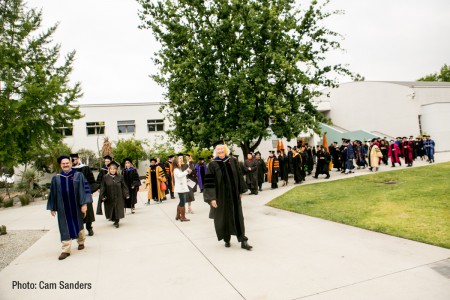
“Being around scholars from different intellectual traditions makes us more creative, more diligent, harder-working, and ultimately generates a better understanding of the world.”
Posted by AJ Leon ’18, Economics & Environmental Public Policy Analysis and Katie Shepherd, Admission Counselor
